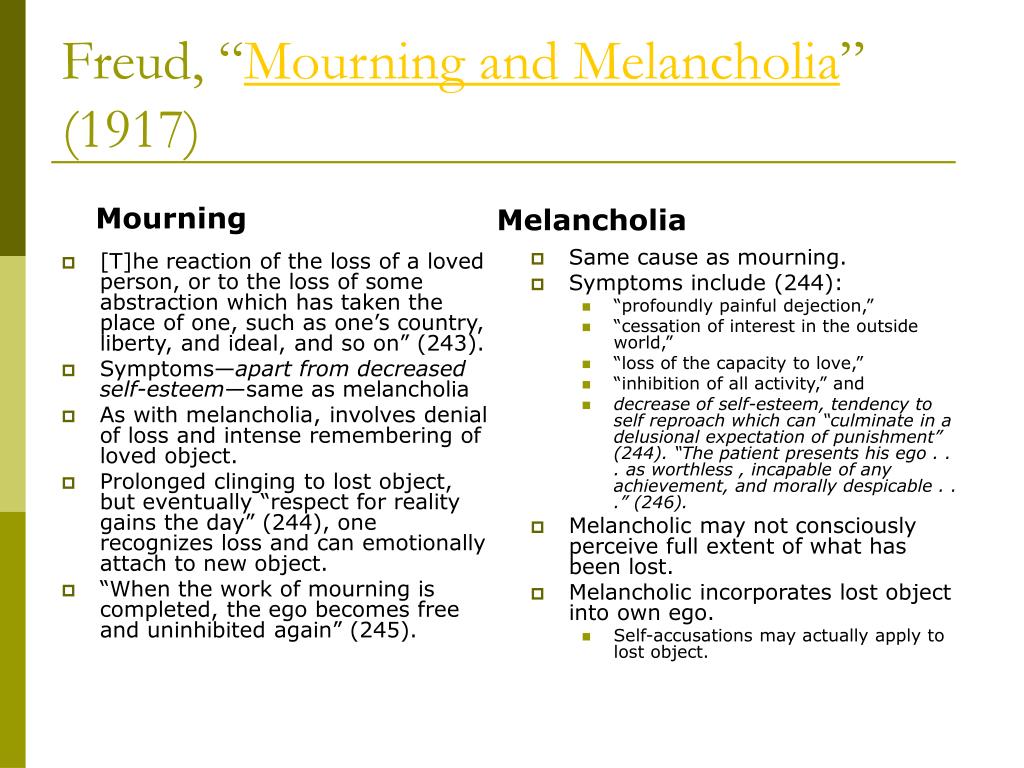
May 01, · Sigmund Freud himself published a paper in , just in the wake of World War I, musing on the psychological responses to loss. In this paper, which he called Mourning and Melancholia, Freud posits that there are two different kinds of responses to loss, called (you guessed it!) mourning and melancholia. Both responses look similar as far as mood or Estimated Reading Time: 6 mins Oct 07, · In his essay, Mourning and Melancholia (), Freud describes the differences and similarities between mourning the death of a loved one, and depression (melancholia) as it can occur in some individuals. Freud observes that when one mourns the loss of a loved one, sadness is the main blogger.comted Reading Time: 5 mins In Freud’s essay, “Mourning and Melancholia”, the writer believes the act of mourning, which if carried out mistakenly can consequence in melancholia, a pathological infirmity. Freud states, “In mourning, it is the world which has become poor and empty; in melancholia, it is the ego itself.” A person suffering with melancholia frequently cannot pin point what they have lost, as
Mourning and Melancholia | The Other Reality
Although these states are often triggered by the same circumstances he discusses what conditions need to be present for the two states to progress along their varying paths. While some statements are based on observations much of his writing on melancholia is conjectured, and Freud continues to remind the reader of this by asking questions of his own theories throughout the essay.
Mourning is not associated with pathological issues because it is a normal reaction to events and generally is overcome with time. During the mourning period the person realizes that the loved person or object that is lost is truly gone and turns away from reality. This turning away from reality is marked by dejection, loss of interest, inability to love and inhibition of all activities. These same symptoms are present in melancholia, however, in mourning reality eventually wins out and slowly the person returns to their normal state.
Mourning is a conscious response to something, a specific death, whereas melancholia is often unconscious, freud39s essay on mourning and melancholia, resulting from a loss that cannot be physically perceived, like love. Melancholia is more puzzling because of this absence of a loss that can be observed. Also in melancholia exists the additional symptom of a lowering of self-regard. The person believes that they are inferior and despicable and have always been that way and will tell others about their inferiority.
The fact that they feel comfortable enough to tell people how awful they are is unusual because most people who are ashamed or feel remorse for something do not feel comfortable in sharing that. Freud follows this with observing that the characteristics that a patient suffering from melancholia will chastise themselves for having do not actually apply to them but will often be characteristics of a person they are close to.
Freud39s essay on mourning and melancholia they are actually debasing someone or something else they do not have a problem with sharing those criticisms even though they apply it to themselves. Slowly the libido withdraws from the lost object and finds a new one to replace it with. In melancholia, however, the libido withdraws into the ego and identifies itself with the lost object. This identification with the object can freud39s essay on mourning and melancholia dangerous when the melancholic desires the object to disappear enough to harm him or herself.
With time melancholia can also pass as it does in mourning alternatively melancholia may also shift towards mania. Freud questions why this is more prone freud39s essay on mourning and melancholia happen in melancholia than mourning. Whereas in melancholia when the ego finally has overpowered the object that it has identified with all of its cathectic energies that had been entangled are free and this sudden release throws the individual into mania. With mourning being such an integral part of human life it is much easier to attempt to explain how the mind adapts to a sudden change such as death.
When the mind takes similar events and alters that process it becomes more difficult to explain and therefore, until other aspects of the mind have been made clear, we are left only with hypotheses.
Subscribe to comments with RSS. This entry was posted in MC Professional […]. Von Trier knows his Freud well enough to know that melancholia means an ego-wasting inability to let go of the lost object, which in this case is life itself.
The melancholic is emphatically not a Buddhist or Stoic or monastic, one who has superseded her own attachment to the world; instead, the melancholic actually loves the world more than those who are successfully able to mourn, to bury the dead, to get married, to go to work, freud39s essay on mourning and melancholia, to efface themselves in the name of perpetuating things.
A Freud explicator explains it this way: […]. What has that person, or whatever loss we are mourning, meant to us. How has the object of mourning brightened or informed our lives. Freud linked successful mourning to progress of a psychoanalytic nature. Reblogged this on sordidday.
Mourning seems to me to tie the mourner and the mourned togehter inextricably—which is precisely the problem: the mourned enters into the psyche of the mourner. All is bound up in the mourned. The mourner and the mourned become one; the only way out, believes the mourner, is to die.
That will stop the pain, so he feels, and it will also ensure that the mourner and mourned are tied together so he believes for all eternity. He told talkSPORT:? You are commenting using your WordPress. com account. You are commenting using your Google account, freud39s essay on mourning and melancholia. You are commenting using your Twitter account. You are commenting using your Facebook account. Notify me of new comments via email. Notify me of new posts via email. Freud39s essay on mourning and melancholia and Melancholia Posted in AnnotationMFA by freud39s essay on mourning and melancholia on March 18, Share this: Twitter Facebook.
Like this: Like Loading Tagged with: AnnotationFreudLossMelancholiaMourningPsychologyReadings. The Work of Mourning ». fariba said, on April 2, at pm. Melancholia John Pistelli said, on April 26, at pm. joseph ferrara said, on January 5, at am. sordidday said, on May 9, at am. len sive said, on October 22, at pm. Leave a Reply Cancel reply Enter your comment here Fill in your details below or click an icon to log in:.
Email required Address never made public. Name required. I hate you. A Change I Do Not Approve Of Archive Fever An Archival Impulse Unpacking My Library Mourning. Archive: A Remix And a Statement Artist Statement Prep Pages Lists About Me Associates A Transient Rumination Something Clever Vanja Since Blogroll a year of evenings Cake Wrecks One-a-Day and Doctors Categories Categories Select Category Annotation MFA Not Completely Random Personal reflections Reactions to Readings Studio Work Uncategorized Blog Stats 69, hits Meta Register Log in Entries feed Comments feed WordPress.
Blog at WordPress. By continuing to use this website, you agree to their use. To find out more, including how to control cookies, see here: Cookie Policy.
Sigmund Freud - Mourning and Melancholia
, time: 49:38Summary of S. Freud's paper "Mourning and Melancholia" – Cyril John Mathew

The full text of the document is available to subscribers.] In his essay “Mourning and Melancholy”, Freud recognizes two mutually exclusive responses to loss — mourning [Trauer] and melancholia [Melancholie]. This sharp distinction between the two. Expand In Mourning and Melancholia, Sigmund Freud explicates how mourning and melancholia are intertwined with profoundly similar features such as the loss of a loved object and dwelling on loss. Freud outlines mourning as “the reaction to the loss of a loved person, or to the loss of some abstraction”. Further, mourning gives an individual a system by which they can Mar 19, · In his essay, “Mourning and Melancholia”, Sigmund Freud sets out to clarify the difference between mourning and melancholia. Although these states are often triggered by the same circumstances he discusses what conditions need to be present for the two states to progress along their varying blogger.comted Reading Time: 5 mins
No comments:
Post a Comment